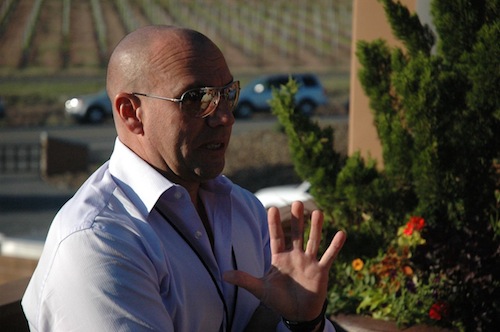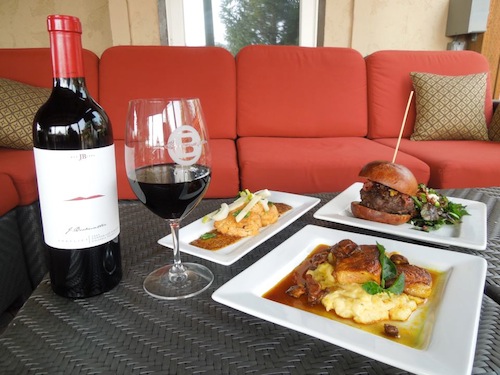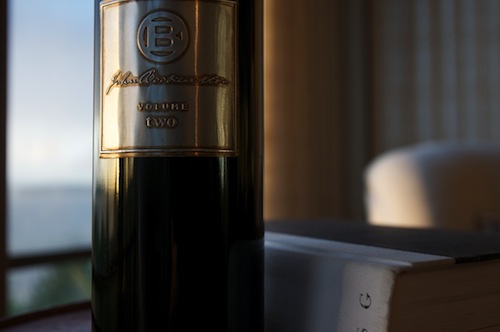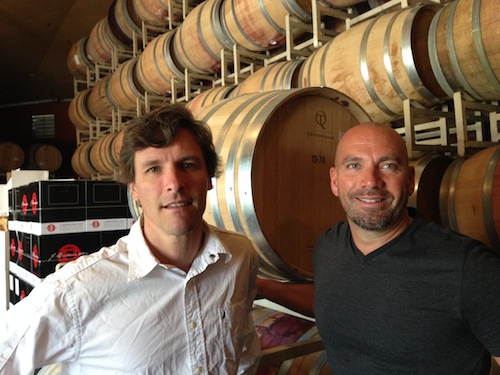
RICHLAND, Wash. – When John Bookwalter returned 19 years ago to take over his family’s winery in the heart of Washington wine country, he had a vision.
“I wanted to be the Silver Oak of Washington,” he says now with a laugh. “I wanted to make Cabernet in volume.”
The owner of Bookwalter Winery in Richland and Woodinville never fulfilled that goal. In fact, a lot of his ideas have turned out differently. And they’ve all turned out well.
The second-generation winemaker has taken a mom-and-pop operation that was barely visible in the 1990s and has not only turned it into a powerhouse, but he’s also helped guide the Washington wine industry into a better direction.
We caught up with Bookwalter via Skype to talk about the evolution of his family winery and the lessons that can be learned from his journey.
Here’s the interview:
[powerpress]
Bookwalters come to Washington

Bookwalter’s parents – Jerry and Jean – met while attending the University of California-Davis, where he was earning a degree in pomology – the study of growing fruits and nuts. She grew up in Southern California, and he was from the Modesto area in the Central Valley.
After college, they worked in agriculture while raising their young family. Jerry worked for Dole and other companies, and ultimately they owned a 40-acre farm where they grew peaches, almonds and Thompson Seedless grapes. Their only connection to the wine industry was Jerry’s mother, who had gone to school with Ernest and Julio Gallo.
In 1975, Jerry took a job in Washington, managing the recently planted Sagemoor Vineyards. Sagemoor, first planted in 1972, was Washington’s first large-scale wine grape vineyard. The owners planted hundreds of acres, counting on the burgeoning Washington wine industry to grow. Today, many industry veterans point to Sagemoor as one of the important fuses that lit the growth of what today is an industry that is pushing toward 60,000 acres of wine grapes and 900 wineries.
“They’re iconic and woven into the history of Washington wine,” Bookwalter told Great Northwest Wine. “Today, it’s my second-largest source, and the fruit is absolutely fantastic from those vineyards.”
In 1976, John moved his young family with him to Washington, and they lived just above the vineyard.
“I thought Dad had moved us to the edge of the Earth,” Bookwalter reflected. “Now, it’s very humbling to know that he was part of something that was so grand.”
By 1983, the Bookwalters looked around at the success of some of the winemakers they were selling grapes to, guys such as Gary Figgins of Leonetti Cellar and Rick Small of Woodward Canyon Winery. So they decided to start Bookwalter Winery.
Bookwalter’s departure – and ultimate return

Young John Bookwalter was having none of this, though. Sure, Eastern Washington is a great place to raise a family, thanks to its sunshine, wide-open spaces and relative dearth of traffic and crime. But the moment he could, Bookwalter left town.
“I was trying to get as far away from Eastern Washington as I could,” he said. “I wanted a little city life, so I chased the sun down to Arizona State and got a degree in marketing.”
From there, ironically, he got into the beverage business. He worked for companies such as Gallo, Coors, Pepsi and Winterbrook Beverage Group. The latter, a still and sparkling water producer, brought him back to the Northwest.
By 1997, Bookwalter yearned to fulfill his dreams of being an entrepreneur, looking up to the mentors he surrounded himself with in the beverage industry.
So he came home.
That fall, he returned to work with his parents, ultimately taking over Bookwalter Winery and turning it into something only he could envision.
“I would say I got the defibrillator out,” he said. “The winery was pretty small.”
At the time, total annual revenues were hovering around a quarter-million dollars, hardly sustainable. It was mostly sweet white wine.
“It was a real mom-and-pop shop,” he said. “That’s the way Mom and Dad ran it. Mom was the G.M., and Dad made the wine and always had other jobs, always managed other vineyards, brokered grapes and developed properties. His income was largely outside the winery.”
Young Bookwalter set out to change that. One of the first things he did was sit down with Figgins to talk about what might be possible. The first thing he noticed is that the internationally acclaimed wines from Leonetti tasted nothing like the wines from Bookwalter. Figgins suggested Bookwalter needed to reinvent itself, and that lesson stuck.
“Dad didn’t want to continue making the wines,” he said. “It takes a lot to reflect on your own skill sets and know that someone else should probably help out.”
They worked with Charlie Hoppes, who had recently left Chateau Ste. Michelle after being its red winemaker for several years and was launching his own Fidelitas Wines while also getting Three Rivers Winery in Walla Walla started.
Then they were introduced to Zelma Long, famed Napa Valley winemaker who was willing to take on Bookwalter in a consulting role. He would be the winemaker, and she would be his mentor.
“I was in full immersion at that point when Zelma and I took over the winemaking,” he said. “I have binders full of the answers to the questions I’ve asked Zelma. She really taught me how to fish. I was like a dry sponge. It was fairly easy to teach me.”
Bookwalter Winery evolves

Today, Bookwalter makes a wide array of wines, from his large-production Bookmark reds that retail for about $10 all the way up to small-lot ultra-premium reds that cost $80 to $100 and are sold only at the winery.
“My dad said, ‘No wine is ever worth more than $20,’ ” Bookwalter said with a laugh, adding that when he comes by to pick up a case of wine each month, he often reaches for the most expensive. “He’s not grabbing the $20 bottles!”
In 2014, Bookwalter hired acclaimed Walla Walla Valley winemaker Caleb Foster to be his winemaker and take over the cellar.
Several years ago, Bookwalter visited South Africa’s wine country and noticed something different: In the tasting rooms, every visitor was deliberately sat down and served. It was just the opposite of what happens on the West Coast, where visitors belly up to a tasting bar and are hurried through a winery’s lineup, then rush to the next destination.
Bookwalter quickly realized that if only he could slow down the tasting experience, he could create a feeling that is completely different. He added leather chairs to the tasting room and encouraged patrons to relax. Later, he added small plates of cheeses and charcuterie. Ultimately, the little tasting room in Richland became a destination not only for those visiting wine country, but also the locals who found it a great place to hang out after work.
“You can’t deny what Starbucks did for coffee,” he said. “They became a destination.”
His cheese plates later developed into a restaurant with a full-time chef, and the tasting room has been transformed. Not only that, but the two wineries next door – Barnard Griffin and Tagaris – also opened restaurants on site, turning Tulip Lane into an entertainment district and tourist attraction.
By 2008, Bookwalter signed a lease on a space in Woodinville, becoming one of the first wineries in Eastern Washington to open a satellite tasting room across the state. This had become possible a few years earlier thanks to a change in state laws that allowed wineries to open second locations.
He opened the doors to his tasting studio just up the street from Chateau Ste. Michelle in August 2008 – just as the national economy was crashing into a deep recession. In the short term, it seemed like a terrible idea, but having that tasting room within a half-hour drive of downtown Seattle became invaluable when the price of gasoline topped $4 per gallon. Wine tourists weren’t driving to the Tri-Cities and Walla Walla as often.
“It certainly kept us more than afloat during those tough recession years,” he said. “I was fortunate to be in that location in the Hollywood District, and look what’s happened now. It’s really exploded in that area.”
For Bookwalter, the Woodinville location is an entryway for getting folks to visit wine country.
“We want everybody to come out to Eastern Washington,” he said. “We want them to experience where the grapes are grown. It’s great to be able to extend our brand there and introduce people to our wines and really make that connection.”
Thanks to hard work, hustle and a vision for what’s possible, Bookwalter now is one of Washington’s most successful family wineries.

Leave a Reply